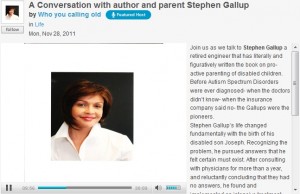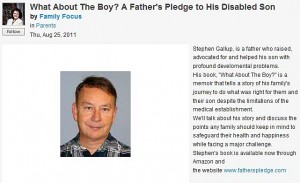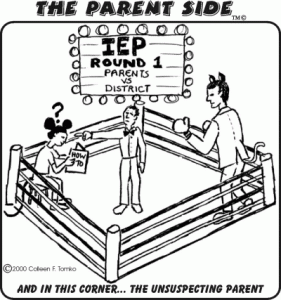Archive for the Category kids
“I have not read a book with so much heart”
 The above kind thought was expressed by Louise Gillespie, just prior to hosting an interview with me on Women’s View Radio, January 10. I thought this was a particularly good interview (and not only because she had so many nice things to say about WATB). Often, hosts don’t have an opportunity to read the book in advance. Sometimes, they don’t even know much about the topic. Those were not problems this time! Also, numerous questions from listeners around the country added depth to the conversation. I’m trying something different in this post. Click the image to the left to hear the audio, or if like me you’re a visual person, click here to open a transcript of what was said.
The above kind thought was expressed by Louise Gillespie, just prior to hosting an interview with me on Women’s View Radio, January 10. I thought this was a particularly good interview (and not only because she had so many nice things to say about WATB). Often, hosts don’t have an opportunity to read the book in advance. Sometimes, they don’t even know much about the topic. Those were not problems this time! Also, numerous questions from listeners around the country added depth to the conversation. I’m trying something different in this post. Click the image to the left to hear the audio, or if like me you’re a visual person, click here to open a transcript of what was said.
Family Stories
 The extraordinarily beautiful child to the left wrestles every day with attention deficit disorder. You can click the photo to learn more about her.
The extraordinarily beautiful child to the left wrestles every day with attention deficit disorder. You can click the photo to learn more about her.
I used to talk rather glibly about all such challenges, but with the passage of time I’m increasingly humbled by how very little any of us really understand. Let’s just say, for the sake of having a concept we can grasp, that developmental disabilities act like partial barriers that impede messages going in to the brain (in the case of something like ADD) and/or output from the brain (in the case of something like stuttering).
Bethany, the mother of this girl, has posted a summary of my family’s story on her blog. There are links to all my guest posts in the sidebar, but I’m giving this one a little more prominence because Bethany is actively looking for additional stories of how families have dealt with developmental issues. The beginning of a new year is an especially appropriate time to recall that it’s mentally satisfying to fight for what we know is right. This is true even if the fight isn’t going exactly as we would choose. If you have lessons to share from your own story, please contact her here.
November 28 Interview with Cecile Forte, PhD
 Today I enjoyed my 12th media interview concerning WATB. As occasionally happens, discussion took off in unexpected directions, so that I failed to make certain points that had felt important when starting out. On the other hand, these conversations have all been good experiences and have certainly kept me on my toes. Please click here for the audio. Excerpt below:
Today I enjoyed my 12th media interview concerning WATB. As occasionally happens, discussion took off in unexpected directions, so that I failed to make certain points that had felt important when starting out. On the other hand, these conversations have all been good experiences and have certainly kept me on my toes. Please click here for the audio. Excerpt below:
“I probably am the biggest winner in the family for the way that things have turned out. That’s one reason why I titled my book What About the Boy?, because I keep trying to bring the focus back to him. Because he doesn’t speak for himself and it’s so obvious to me as I look at the story I’ve written that we can’t avoid seeing things from our own perspective. And he doesn’t really have a way of presenting his case. And so I’m trying to do that for him in writing the book.”
Five Facts for Fathers
 Last week, a group of dads belonging to the National Foundation for Autism Research honored me with an invitation to speak at their meeting. The online announcement said I would talk about my book, but I thought it would be more constructive to discuss a few parenting principles. I went in with a short list, and might’ve run out of things to say in just a few minutes. However, the audience was a public speaker’s dream come true. Everybody was so engaged! All that constructive energy renews my hope that the prospect for our kids is improving.
Last week, a group of dads belonging to the National Foundation for Autism Research honored me with an invitation to speak at their meeting. The online announcement said I would talk about my book, but I thought it would be more constructive to discuss a few parenting principles. I went in with a short list, and might’ve run out of things to say in just a few minutes. However, the audience was a public speaker’s dream come true. Everybody was so engaged! All that constructive energy renews my hope that the prospect for our kids is improving.
Anyway, these are the high points of what I said.
A child who is disabled is, first and foremost, still a child.
This may sound like a bromide, but what I’m recommending comes most easily when you are dealing with an apple-cheeked youngster who says cute things and gives you lots of great feedback. A child with problems that make him less than cuddly or responsive may inspire enthusiasm on your part for finding professional help. And that’s great. However, he also desperately needs to be told, repeatedly, in every way, that he is loved and cherished. Kids who give you no eye contact, or who are rigid or combative, need this reassurance at least as much as anyone else. So in addition to being an advocate, be a daddy.
If your doctor doesn’t take your concerns seriously, consider finding another doctor.
As noted previously on this blog, not all doctors are on board with the importance of early intervention, even today. If you find yourself dealing with someone from the nineteenth century, dump him. The next guy you see may be just as bad, but there are good doctors out there—people who know this. We parents owe it to our kids to find them. Remember: Whatever choice is made, we are the ones who live with the consequences.
Have extravagant goals for your kids.
Swing for the fences. If you strike out, at least you know you tried. Imagining a wonderful outcome is not the same as being in denial. Denial is excluding or ignoring information we need to attend to. It’s pretending that everything is fine when things are not fine. Instead of that, I’m talking about doing everything we possibly can to turn the situation around. For me, the question has always been whether I was willing to relax and coast while knowing that there was something I might be doing that could make a difference. And I wasn’t.
Choose your battles.
Initially, I meant to talk only about not letting other people rope you into promoting philosophies and causes that don’t necessarily benefit your child. However, I spent most of my time talking about unwinnable confrontations with school districts. Everyone present had a lot to say on this topic, and this is where I learned the most. Because these days, parents who are prepared and who don’t quit seem to be winning more often! And as for those causes, participation can be energizing. Well, yes, I did know that. Perhaps some of the lessons impressed upon me over the years have been incorrect. If I give this talk again, this point is the one to work on.
Stay balanced
This one almost seems to contradict the point about swinging for the fences. I think it’s consistent if each of us applies common sense. Our families will not be helped if our own lives are ruined in the process of trying to overcome a chronic problem. We must take care of ourselves while we are taking care of our kids. And since I was speaking to a room full of dads when I said this, I referred to a guest blog post from last summer and finished by recommending hugs for wives as well as for kids.
Interview on the Hollis Chapman Show
Click here to listen to a 30-minute interview with host Hollis Chapman. Excerpt below:
“… Go back to the title, What About the Boy? There’s a temptation, because he’s not communicating with us very well, and we’re wrapped up in our own thinking and we’re anxious—but I think it’s safe to say that he was anxious, too. He was probably scared. He knew, in one way or another, that things weren’t right. He was in distress. And we didn’t know why. And I think the thing that motivated me to say that [I loved him] was that we had been to the osteopath and she had said that this child is probably—here he is almost two years old—he’s never been comfortable once in his life. He has never known what it’s like to be comfortable. And I felt so much compassion for the poor kid, and I think that’s what prompted me to say it. And maybe that made a connection that he was thinking, Oh, at last they understand, or at last I’ve got a lifeline here.”
Interview on Family Focus Radio
 Click here to listen to a nice 30-minute interview with host Line Brunet. Excerpt below:
Click here to listen to a nice 30-minute interview with host Line Brunet. Excerpt below:
They Won’t Cooperate, So What Do We Do?
 I’ve just received an email announcement regarding an attorney’s presentation for families who want to convince their school districts to provide services for their disabled kids.
I’ve just received an email announcement regarding an attorney’s presentation for families who want to convince their school districts to provide services for their disabled kids.
The email has its due share of acronyms that may not mean much to people outside the fray (IEP, IDEA, FAPE, OAH), but the message is pretty clear. Despite whatever the law says, and despite whatever ideals educators may have had when they entered the profession, nothing is fair. Essentially, the attorney will tell parents:
- How to plead the case for individualized services for their child
- To remember that, under the law, they are in theory “equal members of the team”
- How to break through the perception of the “crazy parent”
I used to go through those battles. Two or three times, in wrestling with Joseph’s school, I hired advocates–career educators who knew the lingo and knew how to pounce when the teachers and therapists representing the school tipped their hand. Despite a generally pleasant veneer, it was always an adversarial situation. Obviously, things have not improved.
Given the fact that money is tighter now than at any time in memory, how could things have improved? Fighting the system doesn’t come naturally to most of us. It certainly did not come naturally to me. Of course, seeking help for our kids leads a lot of people outside their comfort zone. But although we do have to seek that help, I can’t avoid wondering whether some avenues are worth the trouble.
Public money for things like individualized ABA programs just isn’t there, if it ever was. Families who insist on it are routinely blamed for their “sense of entitlement” – and generally end up with nothing anyway.
Am I wrong? I say that based on everything I’ve experienced and observed over many years, but somebody please do tell me I’m wrong.
What I like best about Rob Rummel-Hudson’s memoir is his depiction of duking it out with his daughter’s school in hopes of getting an assistive technology device that would help her communicate. In the end, the family raised money via their website and bought the thing themselves. It’s a beautiful victory. Not the end of their struggles, mind you, but the kind of step forward that everyone loves to see.
So, as I’ve suggested before, I like the idea of finding alternative ways of getting what you want. By this point in my life it comes naturally. But again, alternatives are no sure thing, either. Rob’s most recent blog post tells the story of someone who apparently tried to emulate his online appeal for funds but who left the participants with a suspicion of having been duped. Such stories can only hurt future legitimate efforts, in the same way that fraudulent memoirs undermine the perception of those seeking to tell the truth.
I don’t know what the families attending that presentation ought to do. But like the school districts we all have finite resources (I’m talking about time, energy, and spirit as well as money). Governments seldom manage what they have with any wisdom, which is a big part of the reason behind what’s going on in the news today. In comparison, families can reach the end of their ropes a lot sooner, and with more finality. Choose your battles wisely.
It was a dark and lonely night …
 Heard an anecdote today. It may be apocryphal but whether it actually happened really doesn’t matter.
Heard an anecdote today. It may be apocryphal but whether it actually happened really doesn’t matter.
A little old lady is in bed late at night, with the lights out, and she hears somebody trying to break into her house. She dials 9-1-1 but (due to budget cuts–entirely plausible here in California) gets only voicemail. She knows she can’t wait, so she hangs up and checks the phonebook for a doughnut shop. Calls that number and asks the manager if any policemen happen to be there. He says, “Well, yes, as a matter of fact we have two sitting here right now. Would you like to speak to one?” Next thing she knows, the bad guy is getting hauled away in handcuffs.
What’s the point of that tale? Quite simple: If there’s something you absolutely must have, or something your kid needs (which is the same thing), and the normal channels for accessing help aren’t working for you, don’t be surprised. Do be prepared to think creatively.
Maybe it’s a reflection on the quality of my own creative thinking, but I usually find that the first clever idea doesn’t work out that neatly. Staying with the above analogy, the shop is closed, or the cops have already come and gone, or maybe I can’t even find the blasted phonebook. In that case, there needs to be a Plan C. Any number of wild ideas will beat the alternative of giving up. What’s got you stumped right now? And how are you going to get around it?
Save Time, Save Money, Save Your Kid
If that title sounds like a bold promise to be making, please withhold judgment and stay with me for a moment. See what you think of the following, and let me know.
At the time most of the words in WATB were flowing out of my fingertips, the writing was an emotional outlet. But once it had been released, that pressure didn’t require me to spend further time burnishing the writing or putting my family’s life on display. And surely there are easier ways to become a published author, if that was my motivation. There was another reason, which came to me about ten years ago. A lot of people are in need of direction and perspective, and a lot of kids are counting on them to find it.
In hopes of sharing what I knew, I first launched an informational website. WATB is another offering.
By the way, I’m talking to myself here, too. Anything I suggest that sounds like an insight is one I’m still arriving at. Putting the right words together to define the situation is as much a benefit for me, still, as for anyone. That’s why I encourage dialog.
Of course, thanks to the Net, nobody today needs to spend any time being as lost and clueless as my little household remained throughout 1985 and most of 1986, and arguably far beyond that date. In those days, what we knew to be true came from very few sources:
- What we could see (i.e., that our baby was in distress)
- What we believed (that finding a way to help him was our responsibility)
- What the various doctors we consulted told us (first, don’t worry; be patient; and later, don’t blame yourself; and finally, don’t let this thing wreck your life)
- What alternative providers subsequently told us (that a little personal sacrifice on our part could make things much better)
At least some of the above points had to be wrong, or at best incomplete.
The story I tell was a matter of sorting through them
Den ganzen Beitrag lesen…

